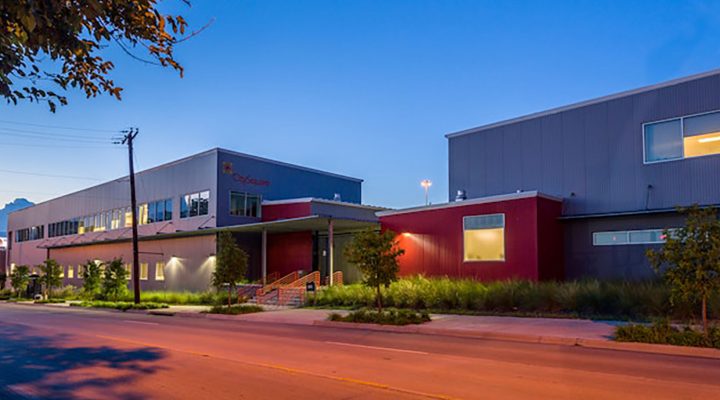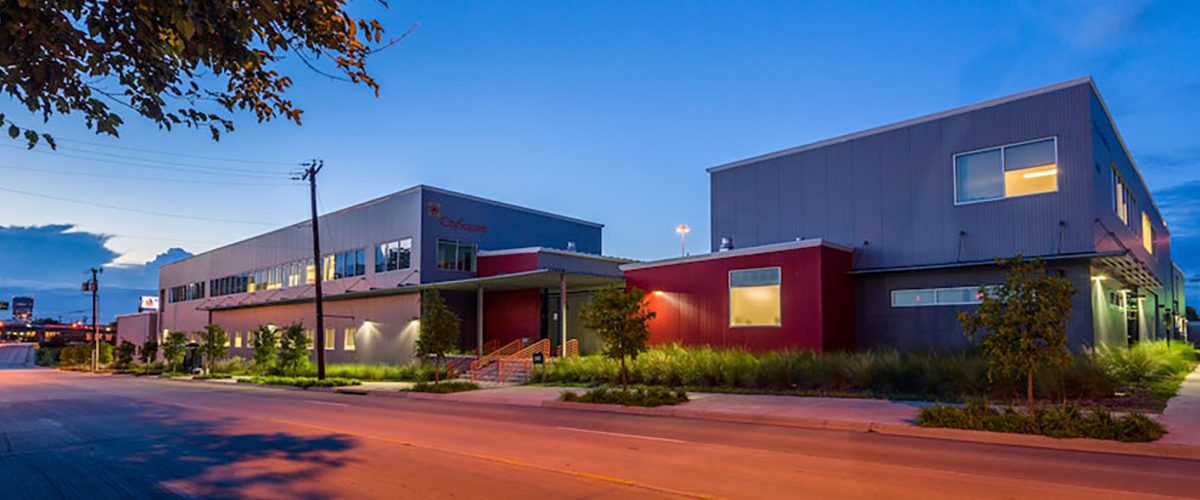It’s not every day a successful, well-known and respected nonprofit saves itself by winding down operations, but that is exactly what CitySquare is doing in Dallas.
Faced with lagging donations and substantial debt, the nonprofit that serves the city’s homeless and impoverished population is methodically transitioning its various services to complementary nonprofits in the area.
At stake is the continuation of programs that in 2023 directly helped 27,540 individuals in need of food, health and housing services. CitySquare’s Food Pantry, one of the largest in Dallas, distributed 2.7 million pounds of food to 12,513 people. Meanwhile, 3,100-plus unique volunteers completed 20,000 hours of service.
CitySquare began in 1988 as Central Dallas Food Pantry, became Central Dallas Ministries and later CitySquare, and was led from 1994 to 2018 by Larry James, a former Church of Christ minister. As founding chief executive officer, James’ name and presence became synonymous with the mission and reputation of CitySquare. James retired in 2018 and was followed in the CEO role by John Siebert, who previously had been on the staff. Siebert was followed by an interim CEO until August 2023 when the board hired Annam Manthiram.
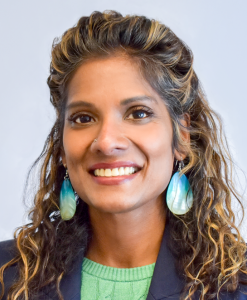
Annam Manthiram
Manthiram came to Dallas from Albuquerque, where she was CEO of HopeWorks, a nonprofit providing shelter, housing and mental/behavioral services to the homeless.
“One of the reasons I came was I was just blown away by the work CitySquare has done since 1988, the breadth and depth of services over the years, what Larry has really built, and then just treating our clients as neighbors,” she said. “We call our clients ‘neighbors’ and holistically look at the causes of poverty and homelessness and try to address them all. So, all of that was something I definitely wanted to continue amplifying.”
Manthiram took the position knowing CitySquare needed help, but she was not fully aware just how much.
“When I came in, I did know there were some financial challenges the organization had been undergoing, but not necessarily the magnitude,” she said. “I also knew the founder had stepped away in 2018 and that there had been a series of leadership changes. So there was a little bit of volatility, I would say, just at the leadership level, and staff were wanting stability.”
Manthiram said her goal was to make sure the organization was still mission-focused after several years of substantial growth, and that everything they were doing was aligned with that mission.
“If we needed a refresh in terms of our mission and vision to make sure we were still remaining relevant to the community, then we were going to undertake a strategic planning process to be able to do that,” she explained.
In time, however, it became obvious that simply redirecting or refocusing the organization was not the issue. Instead, it was a financial deficit that had grown beyond CitySquare’s fundraising capabilities.
“The board wasn’t aware that the year prior, the deficit had been over $3 million, and so that was something I didn’t know,” she said. “I also didn’t know the impact that programs that had been part of CitySquare but had transitioned out would have on the overall organization.”
She explained that CitySquare, in addition to providing services, has been an incubator for nonprofits that have gone out on their own.
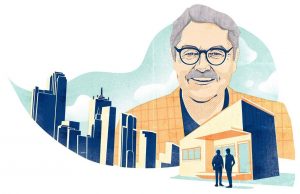
Larry James
“I don’t think there was any sort of long-term analysis done on what that would do to the CitySquare brand to take away some of these programs that were really part of its identity,” she noted. “And so when these programs became their own nonprofits, we lost a lot of donors.”
And then there was the impact of the departure of Larry James. Manthiram said CitySquare lost 70% of its donors between 2018 and 2024.
“A lot of them were very attached to Larry, and maybe attached to the mission too, but he was really the face of CitySquare,” she said. “And with all those leadership transitions, there hadn’t been a stable development base in order to continue building on those relationships. And so that really affected our ability to fundraise.”
Manthiram said she never has worked for a founder-led organization, but she has seen what has happened at other organizations when a dynamic founder and leader departs.
“I didn’t follow a founder directly, but it’s hard to follow a founder without a lot of work being focused on making sure those donors are really connected to the mission and having a really solid fundraising strategy,” she said.
Making the tough decision
The decision to wind down CitySquare was made in May 2024 after a lot of study by Manthiram, the board of directors and her leadership team. They considered a variety of scenarios, ranging from keeping some programs while spinning off others, to what was eventually decided: closing down completely but first turning programs over to other entities.
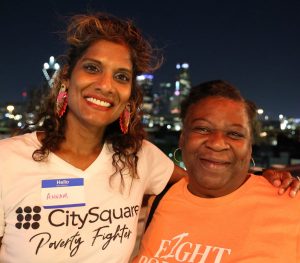
Annam Manthiram with a former client of CitySquare who now serves on the board of directors.
“We had two goals,” she said. “One was to preserve as much of the programming as possible, and two was to ensure our employees had somewhere to go. And doing it this way satisfied both those goals with minimal impact.”
Looking at CitySquare’s broad array of services, it already was known that some grant-funded programs were ending on their own, but partners were needed to pick up the others. That process involved reaching out to the nonprofit community as well as fielding unsolicited offers from organizations.
“It went really well,” Manthiram said. “We had a baseline of: These are the partners we know that are working in homelessness, that are working in poverty or food. So, we started there, and then when our announcement came out in May — and we didn’t have 100% of the plan yet —‚ we had a lot of partners reach out to us, offering to help meet and brainstorm.”
The leadership team met with as many as 30 different partners, including everyone who reached out to CitySquare, and the plan came together.
“I will say what’s been really inspiring to me is the community has rallied around CitySquare and our neighbors and has stepped up to help fill the gaps where we needed partners,” Manthiram said.
Partners pick up the pieces

One of the units at The Cottages at Hickory Crossing.
CitySquare’s goal is to have the transition of all its various programs resolved by the end of November. That includes:
- A Child Nutrition Program was transitioned to several partners: Education PV, FreshQue Foundation, John Howard Foundation, and others.
- CitySquare AmeriCorps is transitioning its 299 members to Equal Heart, a Dallas nonprofit serving and supporting people in times of adversity.
- Destination Home, CitySquare’s largest housing program with 282 neighbors in permanent supportive housing, has been taken on by Housing Forward and three other providers still to be determined by Housing Forward.
- CitySquare’s Homeless Outreach Team will become full-time employees of North Texas Behavioral Health Authority.
- Case management for residents at the 50-unit Cottages at Hickory Crossing (owned by Central Dallas Community Development Corporation) will transition to Catholic Charities.
- A Way Home, a rehousing program for women funded by the City of Dallas, will be taken over by the Salvation Army and The Bridge, a homeless recovery center.
- Health Navigator Program, a United Way-funded program that helps people sign up for health insurance, Medicare and Medicaid, has ended as planned. Likewise, Dallas R.E.A.L. Time Rapid Rehousing Initiative, DIRRTR, a program through Housing Forward, already was going to end as well.
- CitySquare Paris, a program in Paris, Texas, that connects people to food and housing, will continue as its own nonprofit.
- CitySquare’s largest on-site programs — a Food Pantry and Neighbor Resource Center housed in CitySquare’s 53,000-square-foot Opportunity Center near downtown Dallas — will be taken over by The Stewpot, which will acquire the property.
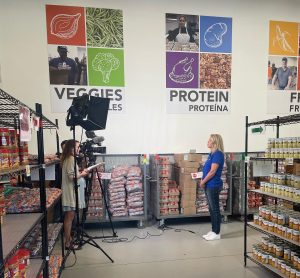
CitySquare’s Food Pantry
“There’s a need for the services we provide, and there’s a need for the services that The Stewpot can add to those existing services,” Manthiram said. “When I came, one of the other goals I had was to make sure that CitySquare wasn’t just band-aiding the problem of poverty; that we were really solving it. And I think The Stewpot’s complementary programs will really help to provide that holistic array of services that can really move people out of poverty in a way that we just weren’t able to do.”
The Stewpot: Taking the biggest bite
The opportunity for The Stewpot to acquire CitySquare’s property was unexpected but came just at the right time, said Brenda Snitzer, chief executive officer. A mission of Dallas’ First Presbyterian Church for almost 50 years, The Stewpot provides services to individuals and families experiencing homelessness, as well as to housed children, families and adults who are low and extremely low income. With the impact of the pandemic as well as recent economic stresses, the organization has tripled in size over the past four years.
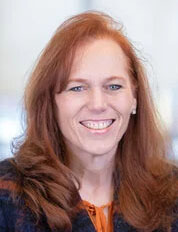
Brenda Snitzer
“The church and The Stewpot leadership have been discerning what we should do because we’ve grown so much and we’ve outgrown our space,” Snitzer explained. “In May when CitySquare announced their need to cease operation and their desire to sell the campus to another nonprofit that could continue, we expressed interest and started meeting with them just like any other nonprofits that were interested.”
CitySquare had established a proposal process based on their current programming and future plans, and with the blessing of the church’s elders, The Stewpot submitted a proposal.
“We submitted that, and we were graciously told that we were the unanimous selection by CitySquare to continue in that process. So we are in the due diligence stage of that,” she said, explaining that includes all the financial, structural and physical inspections that accompany any real estate acquisition. The church’s congregation has the final approval, so there have been listening sessions with the membership to answer questions and discuss concerns, and there will be a final meeting in the coming weeks to share all the information and ask for approval from the congregation.
“A couple of months from now is hopefully when we will have that approval and have everything done so we can purchase the property,” she said. “It’s not a done deal until all the things happen, but also until the congregation makes that choice, which we feel pretty confident about.”
Snitzer noted The Stewpot, which will celebrate its 50th anniversary in 2025, has been just across the street from the church since 1990, while the CitySquare property is a little more than a mile away.
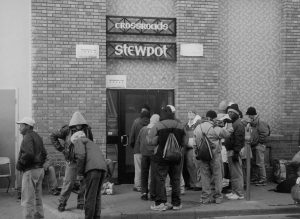
Photo showing people lining up outside an earlier location of The Stewpot at First Presbyterian Church in Dallas. (Photo: The Stewpot)
“The congregation has a lot of connection and love and pride and likes to be able to come over and volunteer, so it’s a change for them,” she said.
On the other hand, The Stewpot has outgrown its 25,000-square-foot facility, but CitySquare’s 53,000-square-foot Opportunity Center on almost 4 acres will provide plenty of room to expand its existing services as well as continue CitySquare’s on-site programs such as the Food Pantry and Neighbor Resource Center.
“We do our food distribution and food recovery program out of our garage, but it’s not really ideal. What CitySquare has for their food programming is ideal,” Snitzer said.
As well, the site includes a large courtyard and plenty of surface parking to accommodate programs such as Street Side Showers, a mobile shower service that comes to The Stewpot twice a month.
About 10,000 square feet of the CitySquare facility is occupied by other entities such as Workforce Commission, but Snitzer said that fits The Stewpot’s “collaborative model” that already numbers more than 20 on-site partners including three medical and dental clinics as well as mental health services.
The Stewpot will move all its programs and staff to the CitySquare campus except for the daily food service that it staffs at The Bridge homeless shelter in downtown Dallas. They plan to integrate CitySquare’s Food Pantry and Neighbor Resource Center with their own food and homeless services and will interview any CitySquare staff who want to transition to The Stewpot.
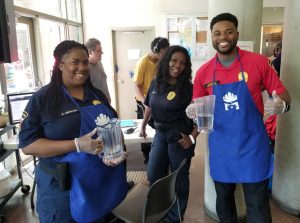
Volunteers at The Stewpot.
While the new Stewpot location will be a little over a mile from its current location, neighbors already are using a collaborative, circulating transportation system called The Connector initiated by CitySquare, The Stewpot and other partners.
Snitzer said the funding to purchase and operate the CitySquare property will be rolled up into a fund drive already planned as part of The Stewpot’s 50th anniversary celebration in 2025.
“In terms of fundraising, we just had to beef up and do it a little more quickly, since we are raising money for this,” she said. “Our budget is about $10 million right now, and with the addition of the two programs and the size of the facility, it’s going to add about another $1 million to our operating costs. So, so we need the community to continue to support us.”
Snitzer said the way The Stewpot’s need to grow and CitySquare’s need to wind down have converged is an answer to prayers.
“As people of faith, we really felt like God’s hand has been in the ministry all this time but also as we were trying to discern what we should do, and so it feels like God’s really been a part of this,” she said. “Again, I would never want this to happen to CitySquare. They’ve been a long-time partner, they’re a great resource in the community. But the fact that everything is falling into place and will allow us to continue some of their ministry and continue to serve the neighbors in the South Dallas and Fair Park community, and have given us the ability to have the strength to do this at this time, is wonderful.”
Snitzer praises the way CitySquare has gone about the difficult work of winding down.
“It has been really wonderful to see how (CitySquare’s leadership) have worked to make sure the neighbors and the staff at CitySquare are taken care of and that the property stays in the nonprofit community, because it would have probably been bought by a developer and that would be such a loss for the nonprofit community,” she said. “We’re grateful for them doing that, not only as another nonprofit supporting their work, but also the opportunity it gives for us to continue not only their legacy but our legacy and serve more.”
And then there was one
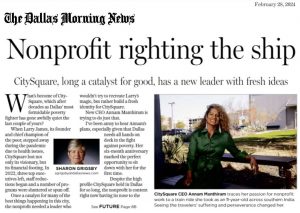 Perhaps an irony to Annam Manthiram’s coming to Dallas to lead CitySquare toward a new future, only to oversee its winding down, is that she has effectively put herself out of a job.
Perhaps an irony to Annam Manthiram’s coming to Dallas to lead CitySquare toward a new future, only to oversee its winding down, is that she has effectively put herself out of a job.
“I’ve been in organizations where I’ve had to close down programs for a variety of reasons. I’ve definitely done that,” she said. “But to wind down an organization this size? No, I’ve never been part of that. But I’m learning a lot and I’m really grateful to the leadership team and our staff who have stayed committed and focused on getting to the finish line. They really care about the legacy of the programs. So, I feel really grateful for that.”
Having moved herself and two sons from Albuquerque to Dallas to lead CitySquare, Manthiram said she is not ready or planning to leave.
“I hope something happens and opens up for me so I can stay in Dallas,” she said.
Asked if she has any advice for nonprofits facing difficult times, Manthiram said: “I would say to ask the difficult questions, have the difficult conversations with the board, make sure the board is aware of what is going on, and prioritize the staff and the clients and neighbors. At the end of the day, it’s not really about our egos, it’s about the work. And I think if there’s a way an organization can continue its programs, even though it may not be able to continue its name, that’s what’s most important.”

